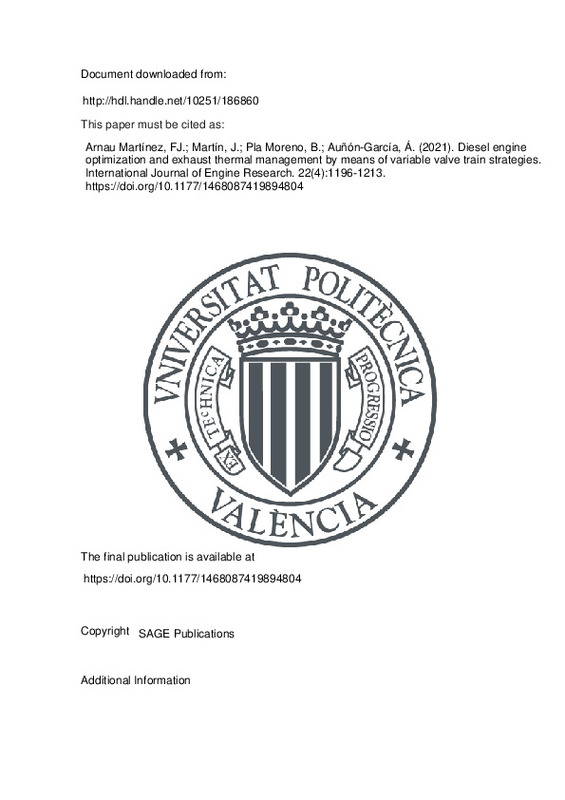JavaScript is disabled for your browser. Some features of this site may not work without it.
Buscar en RiuNet
Listar
Mi cuenta
Estadísticas
Ayuda RiuNet
Admin. UPV
Diesel engine optimization and exhaust thermal management by means of variable valve train strategies
Mostrar el registro sencillo del ítem
Ficheros en el ítem
| dc.contributor.author | Arnau Martínez, Francisco José
|
es_ES |
| dc.contributor.author | Martín, Jaime
|
es_ES |
| dc.contributor.author | Pla Moreno, Benjamín
|
es_ES |
| dc.contributor.author | Auñón-García, Ángel
|
es_ES |
| dc.date.accessioned | 2022-10-03T18:05:55Z | |
| dc.date.available | 2022-10-03T18:05:55Z | |
| dc.date.issued | 2021-04 | es_ES |
| dc.identifier.issn | 1468-0874 | es_ES |
| dc.identifier.uri | http://hdl.handle.net/10251/186860 | |
| dc.description.abstract | [EN] Due to the need to achieve a fast warm-up of the after-treatment system in order to fulfill the pollutant emission regulations, a growing interest has arisen to adopt variable valve timing technology for automotive engines. Several variable valve timing strategies can be used to achieve an increment in the after-treatment upstream temperature by increasing the residual gas amount. In this study, a one-dimensional gas dynamics engine model has been used to carry out a simulation study comparing several exhaust variable valve actuation strategies. A steady-state analysis has been done in order to evaluate the potential of the different strategies at different operating points. Finally, the effect on the after-treatment warm-up, fuel economy and pollutant emission levels was evaluated over the worldwide harmonized light vehicles test cycle. As a conclusion, the combination of an advanced exhaust (early exhaust valve opening and early exhaust valve closing) and a delayed intake (late intake valve opening and late intake valve closing) presented the best trade-off between exhaust temperature increment and fuel consumption, which achieved a mean temperature increment during low-speed phase of the worldwide harmonized light vehicles test cycle of 27¿°C with a fuel penalty of 6%. The exhaust valve re-opening technique offers a worse trade-off. However, the exhaust valve re-opening leads to lower nitrogen oxide (29% less) and carbon monoxide (11% less) pollutant emissions. | es_ES |
| dc.description.sponsorship | The author(s) disclosed receipt of the following financial support for the research, authorship, and/or publication of this article: This research has been partially funded by the European Union's Horizon 2020 Framework Programme for research, technological development and demonstration under grant agreement 723976 ("DiePeR") and by the Spanish government under the grant agreement TRA2017-89894-R. The authors want to acknowledge the "Apoyo para la investigacion y Desarrollo (PAID)," grant for doctoral studies (FPI S2 2018 1048), of Universitat Politecnica de Valencia. | es_ES |
| dc.language | Inglés | es_ES |
| dc.publisher | SAGE Publications | es_ES |
| dc.relation.ispartof | International Journal of Engine Research | es_ES |
| dc.rights | Reserva de todos los derechos | es_ES |
| dc.subject | Variable valve actuation | es_ES |
| dc.subject | Variable valve timing | es_ES |
| dc.subject | Light-duty diesel engine | es_ES |
| dc.subject | After-treatment thermal management | es_ES |
| dc.subject | One-dimensional model | es_ES |
| dc.subject | World harmonized light-duty vehicle test procedure | es_ES |
| dc.subject | Light-off temperature | es_ES |
| dc.subject | Diesel engine emissions | es_ES |
| dc.subject.classification | MAQUINAS Y MOTORES TERMICOS | es_ES |
| dc.title | Diesel engine optimization and exhaust thermal management by means of variable valve train strategies | es_ES |
| dc.type | Artículo | es_ES |
| dc.identifier.doi | 10.1177/1468087419894804 | es_ES |
| dc.relation.projectID | info:eu-repo/grantAgreement/AEI/Plan Estatal de Investigación Científica y Técnica y de Innovación 2013-2016/TRA2017-89894-R/ES/METODOLOGIA PARA LA PREDICCION DE EMISIONES DE CO2 Y CONTAMINANTES DE UN MOTOR ALTERNATIVO/ | es_ES |
| dc.relation.projectID | info:eu-repo/grantAgreement/UPV//FPI S2 2018 1048//Apoyo para la investigación y Desarrollo (PAID)/ | es_ES |
| dc.relation.projectID | info:eu-repo/grantAgreement/EC/H2020/723976/EU | es_ES |
| dc.rights.accessRights | Abierto | es_ES |
| dc.contributor.affiliation | Universitat Politècnica de València. Departamento de Máquinas y Motores Térmicos - Departament de Màquines i Motors Tèrmics | es_ES |
| dc.description.bibliographicCitation | Arnau Martínez, FJ.; Martín, J.; Pla Moreno, B.; Auñón-García, Á. (2021). Diesel engine optimization and exhaust thermal management by means of variable valve train strategies. International Journal of Engine Research. 22(4):1196-1213. https://doi.org/10.1177/1468087419894804 | es_ES |
| dc.description.accrualMethod | S | es_ES |
| dc.relation.publisherversion | https://doi.org/10.1177/1468087419894804 | es_ES |
| dc.description.upvformatpinicio | 1196 | es_ES |
| dc.description.upvformatpfin | 1213 | es_ES |
| dc.type.version | info:eu-repo/semantics/publishedVersion | es_ES |
| dc.description.volume | 22 | es_ES |
| dc.description.issue | 4 | es_ES |
| dc.relation.pasarela | S\412481 | es_ES |
| dc.contributor.funder | AGENCIA ESTATAL DE INVESTIGACION | es_ES |
| dc.contributor.funder | COMISION DE LAS COMUNIDADES EUROPEA | es_ES |
| dc.contributor.funder | Universitat Politècnica de València | es_ES |







![[Cerrado]](/themes/UPV/images/candado.png)

